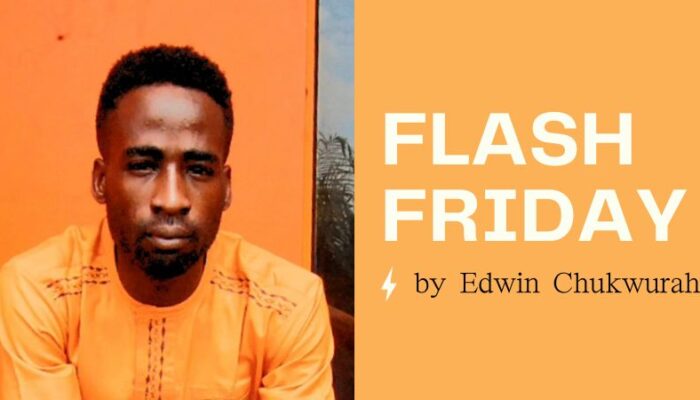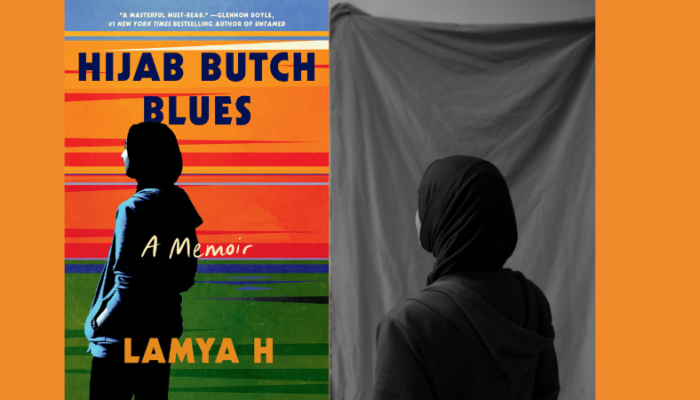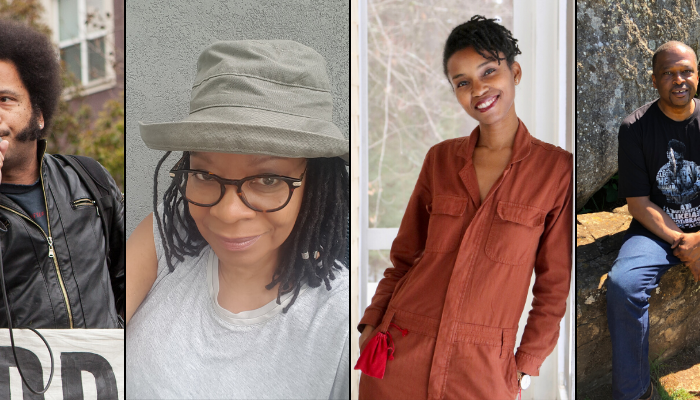Fouzia Najar is the creator of “Semiotics of Islam: A Primer for Kuffar”, a short experimental film that deals with media representations of Muslims. Publisher Zinzi Clemmons spoke with Najar via phone about her portrayals of Islamophobia and the politics of representation on screen and in her career. “Semiotics of Islam” premieres tomorrow as part of the Queens World Film Festival: 6pm, Wednesday, March 18 at PS 69 in Jackson Heights, Queens, NY.
Zinzi Clemmons: Can you describe your film for our readers?
Fouzia Najar: My film is based on “Semiotics of the Kitchen”, a 1975 short film by Martha Rosler. It was a performance piece in which the sole actor mimed the uses of various kitchen items in alphabetical order. It was supposed to be a rebellion against the oppressive space of the kitchen for a woman like herself. It’s all one take, it’s very simple, and the woman gets more aggressive as it goes on. It’s kind of funny, but it’s also kind of violent. My film is also a performance piece, also one woman, and it uses space in a different way. The oppressive force on the woman in my piece is the media. Television clips that talk about Muslims are projected on her body, and as they go on, she redefines the items or concepts in the media clips. In both films there’s a didactic approach, but in a sarcastic way.
ZC: When you say didactic, you mean using a didactic form to make a more subtle point, because I don’t think either film is didactic.
FN: Yeah, I think there’s certainly information going on, maybe more so in mine. You’re right, both of these films are more subtle than that, but in both there’s a fine line between the audience actually learning something and being taught a lesson.
ZC: How did you hope people would respond to this piece versus how they’ve actually responded?
FN: Well, first of all, not that many people have seen the film. I’ve gotten good feedback from the people that have seen it. I think I could have mostly anticipated the feedback that I’ve gotten. I’ve liked it most when I’ve been in an audience and people laugh. There was an audience in Harlem where someone told me that they learned something, which was kind of the point.
ZC: What type of audiences were these?
FN: The places it’s screened have been very small: either academic (my graduate school), or more public (the First Person Plural reading series in Harlem). There haven’t been that many large audiences. Some people have seen it when I emailed it to them. The people who mostly laugh are Muslims, and the people who learn something are mostly non-Muslims.
ZC: As a product of second-wave feminism, are there aspects of “Semiotics of the Kitchen” that are problematic, especially to women of color? Is “The Semiotics of Islam” supposed to offer a direct critique or rebuttal to any aspects of SOTK?
FN: Second-wave feminism is so far removed from where we are in time, but there are a lot of elements of it happening now that are making feminism a movement that is less inclusive than it should be. In SOTK, there’s a white woman, she’s very thin, she’s got straight hair, which was very popular at the time. It was a rebellion against a domestic role that only that class of women could really reject.
ZC: It was housewives…
FN: It was educated housewives. Women of our ilk [women of color] don’t always understand what that would be like—to be very educated and not have a job. A lot of my family who were contemporaries of the film, they had a different experience. For example, my grandmother worked outside the house, and my father knew how to cook and how to take care of children at a very young age.
I don’t think it’s particularly right to encourage women all across the world right now to get out of the kitchen, when oftentimes there are choices made. Our brand of feminism in the US doesn’t fit all cultures. A lot of time poverty is what’s keeping people in this role, or there are no jobs outside the home. Though I like SOTK, maybe even in the past few years I’ve had a bad taste in my mouth about its influence, because that actor is supposed to be representing all of us.
One of the biggest misconceptions with second-wave feminists, but also the mainstream media and the world think that Muslim women need to be saved. The problem is that they’re not giving Muslim women the agency to do it themselves, they’re making a judgment on a cultural and religious context that they’re not familiar with at all. Progress is on a Western timeline, and they think that that feminism fits the whole world.
ZC: You’ve told me about some of the negative or unhelpful reactions viewers have had to your piece. The most frustrating question, I think, has been related to the question of audience. Non-Muslim (often white) people have said that it’s only relevant for Muslims. Where does this criticism come from? This is related to one of your previous answers, when you said that Muslims laugh and non-Muslims learn. The idea that the film is only made for one audience is taking that to a bad extreme, I think.

FN: Even though it’s 2015, I think white audiences are really uncomfortable when media doesn’t speak directly to them. My film is anti-Islamophobic, so technically it’s speaking to non-Muslims of any color. There are white Muslims. I’ve gotten pushback on things that non-Muslims don’t understand and therefore don’t value. You and I consume media all the time where we’re not the protagonists, we weren’t in the creator’s mind, but we still consume it and we’re used to it.
ZC: We have no choice.
FN: It was important to me that the primary audience recognize themselves in it, certainly non-Muslims, because there’s not that much representation of them that’s healthy or constructive or accurate.
The sub-title of the film is “A Primer for Kuffar”, and since graduating, I took out the translation [of Kuffar], because there are plenty of times when I don’t understand what’s happening in a movie because of cultural context, or because of vocabulary. I was like, viewers can Google it.
The problem is, if you Google Kuffar, the first thing that comes up is Urban Dictionary, which is a bastion of racism, and it defines it as the lowest insult that an Arab can give to a non-Muslim. Sometimes it means people not of the Abrahamic religions; pre-Islamically it meant people who don’t believe in science or logic. I felt like non-Muslims came to this word that had given them so much trouble, and they defined it how they wanted to. An incorrect representation was what I was trying to avoid. There are certain words in the news that aren’t translated properly—Jihad, Allah, “Sharia law”—Kuffar was an inside joke.
At the end of the film, there’s a dedication to my mother that flashes three times. That’s based on the proverb, when someone asks the Prophet who in this world do you most highly esteem, and he says my mother. They ask him who is next and he says my mother. Then again and he says my mother. It meant a lot to me, and my professors suggested that I cut it because they didn’t get it. It was very important to give props to my mom, but also to making a Muslim feminist piece. Me even being able to make it because of my mother.
Even though there’s a push in documentary film and tv for people of color, they’re not encouraging POC to make their own films. It’s mostly tokenism. There have to be texts that are not written for white people, or non-Muslims.
ZC: In what other ways has the experience of putting this film out into the world disappointed you, encouraged you, etc.?
FN: February was a particularly violent month against Muslims, not just in death but in attacks and vandalism. I would like the film to have a larger audience now. If it doesn’t prevent someone from murdering someone else, it might help people’s mindsets and how they interpret the media.
ZC: How has being a woman and/or Muslim and/or person of color effected your filmmaking? Maybe talk about your work with Diverse Filmmakers Alliance?
FN: Last year after graduating, I co-founded a filmmaking collaborative with two other Asian women. We wanted to create a safe space to discuss our films, where they weren’t discussed in a certain way—as tokens or “poverty porn”—you know, people making a movie about gentrification without any people of color in it, stuff like that. It’s helpful for working through the process of filmmaking, but it’s also been a boon to recognizing when other people are being full of shit. We can share our experiences and be like, oh yeah, that was fucked up.
There are a lot of identities that I have that made it difficult for me to break into filmmaking. As a woman, it was hard for me to break into the technical side, especially running the equipment. I think it’s still a boy’s club and will be for awhile. But sometimes if my subjects are Muslim, it helps to be Muslim. There’s more trust there, and I certainly have been hired for a job because I’m Muslim, or with Muslim women because I’m a Muslim woman.
ZC: For the past few years, you’ve been working on projects about Islamophobia—the last was on the NYPD’s surveillance of Muslims. Can you talk about this subject a little? How was your approach different in those two projects, and how does that tie into what’s going on in the country now.

FN: I started grad school in September 2011, and slowly in that late summer, these NYPD documents were being leaked—probably by a Muslim former officer—that showed there was an obvious surveillance program happening that spanned several states. They were in schools like the one I was at, infiltrating Muslim student associations. The extended surveillance was on CUNY, not private schools—they were places where the tuition was not very high. It was kind of a war on lower- to middle-income students and their families. We were working for an organization with a lot of interns from these schools called CAIR (the Council on American and Islamic Relations) New York, that’s how it started.
You can tell from the documents that the surveillance program was kind of willy-nilly and just really racist. It was leaked that a movie called The Third Jihad, which you can watch on Netflix and YouTube, was used as training. Rudy Giuliani is in it and former NYPD Police Commissioner Ray Kelly, they appear as interviewees. There was a document released called “Ancestries of Interest”, which was basically telling all officers to watch people from these countries. I think there were at least 30 countries on there, basically any country with a Muslim majority. The last line was “Black American Muslims”. That’s not a country, that’s a race. It’s very revealing what this was about.
It was revealed later that they were spying on richer campuses as well, and on the Monday after, a chaplain lead an open meeting there. At Hunter, it took five months, and it was a bullshit apology. The Dean of Diversity and Compliance tried to take peoples’ names who came to the meeting, and the meeting was actually just a Friday prayer. I videotaped it, but I never used it because all the kids were so wigged out.
I wouldn’t say that 9/11 was the beginning of Islamophobia in this country, but because of 9/11 there have been supposedly temporary acts that have basically made it legal to discriminate based on religion. It’s unconstitutional, but the NYPD has gotten away with it.
My mom was on a no-fly list for a few years after 9/11. I have a Muslim name, and I don’t know if the TSA is smart enough to understand that. They should have Muslim TSA agents [laughs]. Certainly if you look religious—and I just said that in air quotes because what does that even mean—you’re getting it at the airport for sure. If you’re wearing hijab, if you’re visibly Muslim.
That’s the other thing, just talking about whiteness. Those three kids in Chapel Hill—if you look at their pictures, those are white Arabs. There were black Muslims, or Muslims of recent African descent killed or attacked that week. The kids in Chapel Hill got the most press. Someone is white, but when they put on a hijab it makes them not white? Arab countries have a lot of issues with race and class.
ZC: It’s interesting how ignorant Americans are to these nuances. It’s contributed to a lot of incidents and bad policies. In some instances it’s also saved people, because people are ignorant to what, according to their own policies, they should actually be looking for. There’s a block—we think that if someone is Muslim, that’s their race and they can’t be anything else. It’s pretty stupid.
Last question: If you had an unlimited budget and time, what film would you make?
FN: I have always wanted to make a film in Kashmir, which is where my parents are from. Most recently I’ve been thinking about making it on mental health—PTSD or depression from war. It would take a lot of time and budget because it’s difficult to plan internationally. In terms of money, I’d need transport, bribes for Indian soldiers, equipment, all these things. I’ve been wanting to make it for 20 years now.
ZC: Anything else to add?
FN: If there are any readers who work in nonprofits or after school programs, I’m interested in planning screenings of the film and holding discussions. Please contact me!
Fouzia Najar is a Kashmiri-American filmmaker from Buffalo, NY. She earned an MFA in Integrated Media Arts from Hunter College, and before that, studied history and media at Carleton College. She has worked for award-winning production companies Kartemquin Films and ABC News and Jigsaw Productions, and her work has aired on networks like The Weather Channel and CNN. Fouzia most recently worked on a documentary series that examines the death penalty in America and co-founded Diverse Filmmakers Alliance, a media collective dedicated to ethical practices and representation in storytelling. She is currently developing a series on genius. Twitter: @onthefo





